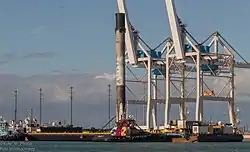Falcon 9 B1056
Falcon 9 booster B1056 was a reusable Falcon 9 Block 5 first-stage booster manufactured by SpaceX. The booster was the fourth Falcon 9 to fly four times and broke a turnaround record for an orbital class booster on its fourth flight. The booster's service came to an end on its fourth flight following a landing failure on a Starlink flight.[1]
| Falcon 9 booster B1056 | |
|---|---|
.jpg.webp) | |
| B1056 lands after launching CRS-18 | |
| Role | First stage of orbital class rocket |
| National origin | United States |
| Type | Falcon 9 first stage booster |
| Manufacturer | SpaceX |
| Construction number | B1056 |
| First flight | 4 May 2019 (CRS-17) |
| Last flight | 17 February 2020 (Starlink L4) |
| Flights | 4 |
| Status | Intentionally sunk after surviving a water landing |
Flight history
First flight
B1056 entered service on May 4, 2019, lofting a Dragon to the International Space Station in support of CRS-17. The vehicle landed aboard the autonomous spaceport drone ship Of Course I Still Love You approximately eight and a half minutes after launch.[2] Normally, first stages supporting CRS missions land at LZ-1, however a failed static fire of a Crew Dragon contaminated the landing pad. This forced B1056 to land just 28 km downrange on OCISLY.[3]
Second flight
On July 25 2019, B1056 launched a second CRS mission, carrying a Dragon to the ISS in support of CRS-18. Following stage separation, B1056 landed at Landing Zone 1 at Cape Canaveral Air Force Station. This flight demonstrated the first time a Dragon spacecraft flew for a third time.[4]
Third flight
B1056 made its third flight on December 16, 2019, carrying JCSAT-18/Kacific-1 to geostationary transfer orbit. About eight minutes after launch, B1056 landed on Of Course I Still Love You - completing its first GTO mission.[5]
Fourth flight
B1056 became the fourth booster to re-fly a fourth time, also breaking a turnaround record, achieving just 63 days between its previous flight. The previous record was held by B1045 for nearly two years. Since then, B1060 and B1058 have both broken the world record previously held by Space Shuttle Atlantis, both with a 27 day turnaround time. The flight was expected to be the 50th successful landing [6] but ended up being the first time a flight-proven booster suffered a landing failure[7] due to incorrect wind prediction.[8] The booster was initially reported to be intact but was subsequently scuttled and did not return to port.[9]
Launches
| Flight # | Launch date (UTC) | Mission # | Payload | Pictures | Launch pad | Landing location | Notes |
|---|---|---|---|---|---|---|---|
| 1 | May 4, 2019 | 70 | CRS-17 | .jpg.webp) |
SLC-40 | Of Course I Still Love You | Landed on droneship due to contamination of ground pad |
| 2 | July 25, 2019 | 73 | CRS-18 | .jpg.webp) |
SLC-40 | LZ-1 | Carried the third International Docking Adapter |
| 3 | December 16, 2019 | 77 | JCsat-18 |  |
SLC-40 | Of Course I Still Love You | Originally scheduled to fly on CRS-19, the booster was swapped out for a new booster |
| 4 | February 17, 2020 | 81 | Starlink L4 |  |
CC-40 | Failure | Flight carrying 60 Starlink satellites. Was the fastest turn around of a booster, breaking the record held by B1045 since June 2018. First flight proven booster to fail landing[7] |
References
- Baylor, Michael. "SpaceX successfully conducts fifth Starlink flight - booster misses dronship". NASASpaceflight. NASASpaceflight. Retrieved 25 February 2020.
- "CRS-17 Presskit" (PDF). spacex.com.
- Clark, Stephen. "SpaceX likely to move next rocket landing to drone ship – Spaceflight Now". Retrieved 2019-12-14.
- Thompson, Amy. "SpaceX Launches Used Dragon Capsule on Historic 3rd Cargo Run to Space Station". Space.com. Space.com. Retrieved 25 February 2020.
- "KACIFIC-1 PRESS KIT" (PDF). spacex.com.
- Davenport, Christian. "Elon Musk's SpaceX is about to land its 50th Falcon 9 booster". Washington Post. Retrieved 25 February 2020.
- "A farewell to hackadays favorite falcon 9 booster". 25 February 2020.
it has the dubious honor of being the first reused Block 5 booster to be unintentionally destroyed.
- Baylor, Michael [@nextspaceflight] (6 March 2020). "Hans: Last launch had a landing failure due to the winds that the booster encountered not being as predicted. Therefore, the booster decided to divert to a water landing to protect the droneship" (Tweet) – via Twitter.
- Cornwell, Gavin [@SpaceXFleet] (February 23, 2020). "B1056 scuttled at sea" (Tweet). Retrieved 25 February 2020 – via Twitter.